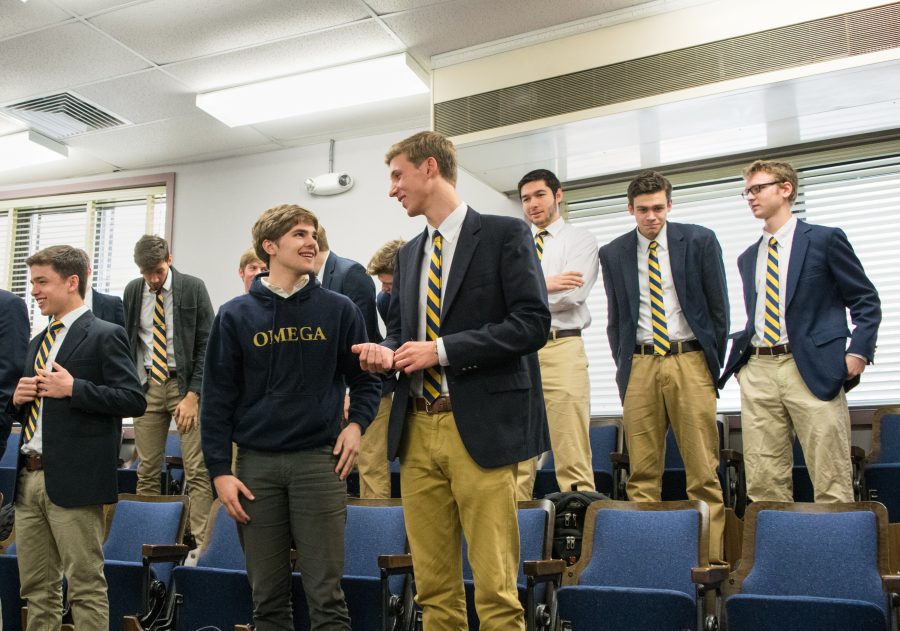Every one of BJU’s 35 men’s and women’s societies has its own unique culture, attitudes and traditions.
Many of the elements of a society change over the years as different students come and go, but many societies have traditions that transcend from year to year, or in some cases even decade to decade.
Here are some of the most notable traditions that have been passed down from society generation to generation.
Nu Delta Chi Vikings:
Night Mail Serenade
A long-standing tradition for BJU societies has been handling the responsibility of delivering night mail to each of the residence halls.
Most societies carry out this tradition in mostly dutiful silence, but the Vikings like to make things a little more interesting (and boisterous).
Rather than simply dropping off the load of night mail, the Vikings turn the delivery into a performance by serenading the women’s residence halls.
“The singing keeps night mail delivery interesting, and people seem to really enjoy the traditional Hispanic songs we sing,” said Cristian Valadez, a senior biology major and president of Nu Delta Chi.
Valadez says the Vikings have been conducting their night mail serenading ever since he was a freshman and probably long before then.
Michael Munoz, a junior criminal justice major in the Vikings, shared why he enjoys the Vikings’ night mail serenades.
“It’s fun to hang out with the other guys in society, and to provide some free entertainment while we’re at it,” Munoz said.
Chi Kappa Delta:
Dragon Balloons
Perhaps one of the longest running traditions, the Dragons have been conducting their symbolic balloon release ceremony since the 1990s, and it’s even written into their constitution.
Twice a school year the Dragons release green and yellow balloons (their society’s colors) to welcome new girls into the society.
The Dragons’ president, Hannah Romero, a senior creative writing major, said the tradition helps “build unity and spirit and to make new members feel like they’re part of the group.”
While the balloons are being released the entire society repeats their “Dragon Oath” (“I am a Chi Kappa Delta Dragon, and I will breathe fire forever.”)
Phi Kappa Pi:
Ram of the Week
Many societies have a variation of this tradition (i.e. Wolf of the Week, Dragon of the Week, etc.) It usually involves society members volunteering humorous or interesting stories that have taken place recently. In Phi Kappa Pi’s case, once every one has shared their story, the entire society votes to decide which person is worthy of the title of “Ram of the Week.”
According to the Quentin Ames, a senior engineering major and president of the Rams, the earliest record he can find of Ram of the Week came in the early 2000s. He also explained how sharing these stories benefits the entire society.
“We share these weekly stories to build unity and get to know people in our society,” Ames said. “The coolest thing about Ram of the week is that most of the time, multiple rams were a part of the incident which shows how close we are outside of society as well.”
The Rams do add a unique element to this common tradition: the person designated as “Ram of the Week” must carry around some object that shows they’ve received the award (For a while it was a miniature, plastic unicorn.)
Why the unicorn you ask? The idea is that if people see you carrying a strange item (such as a unicorn), they’ll probably stop you and ask why you’re carrying it, thus compelling you to share the story with them.
Some of the most memorable Ram of the Week stories often involve Artist Series date mishaps or other similar humorous anecdotes, although the stories aren’t strictly funny.
“When you hear these stories, you’re almost getting to know the people involved because you’re hearing something about them, and you remember them for it,” Ames said of the tradition.
Alpha Omega Delta:
Matching Ties
One of the most eye-catching society traditions on campus might be Omega’s wearing matching sport coats and ties during weekly society meetings.
Omega’s president Vince Wilson, a senior nursing major, said the matching attire tradition has been around since the society’s inception in 1947, but the outfit didn’t become a standardized weekly tradition until the 1980s.
“Omega has seen many weekly traditions come and go within the past decades, but certain traditions have withstood the test of time,” Wilson said.
Wilson said the matching clothes have significance beyond coherence and professionalism.
“Omega chose this tradition to demonstrate unity to each other and to the rest of the student body,” Wilson said.
Outside of the matching coats and ties, Omega also holds the doors and passes out mints as students leave the Alumni Building on Fridays following the end of society meetings.

























































